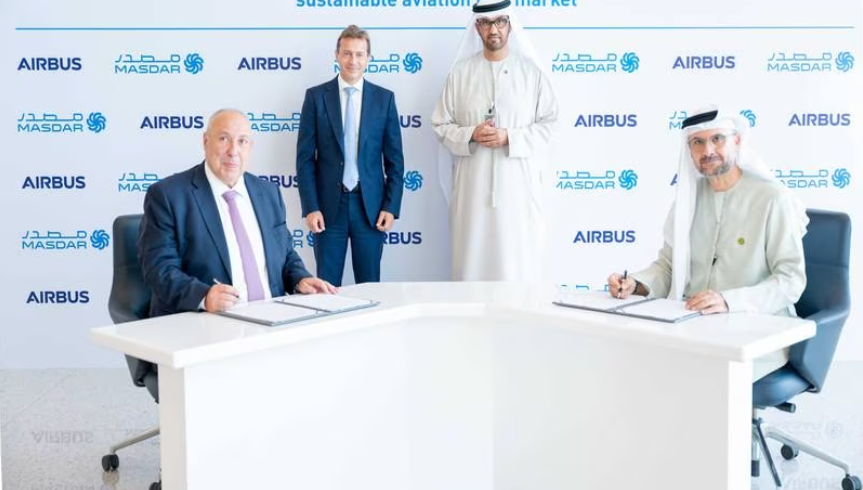Both companies will focus on the development of green hydrogen and direct air capture technology

Masdar chairman Dr Sultan Al Jaber and Airbus chief executive Guillaume Faury oversee the signing of the agreement. Photo: Masdar
Abu Dhabi’s clean energy company Masdar and European plane maker Airbus have signed an initial pact to support the growth of the global sustainable aviation market amid green transition efforts.
The two companies will collaborate on the development of sustainable aviation fuels, green hydrogen and direct air capture technology, Masdar said on Tuesday.
“This MoU with Airbus further amplifies Masdar’s commitment to accelerating the reduction of global carbon emissions and pioneering worldwide efforts towards decarbonisation,” said Masdar chief executive Mohamed Al Ramahi.
“We look forward to working closely with Airbus to support the development of the global sustainable aviation fuel market and to exploring the adoption of creative low-carbon solutions in support of net zero.”
The agreement was signed in the presence of Dr Sultan Al Jaber, Minister of Industry and Advanced Technology, chairman of Masdar and Cop28 President-designate, and Airbus chief executive Guillaume Faury.
The use of sustainable aviation fuel based on green hydrogen and direct air capture is expected to reduce greenhouse gas emissions by up to 95 per cent when compared with conventional jet fuel.
The size of the global sustainable aviation fuel market will exceed $14 billion by 2032, according to Precedence Research.
“Sustainable aviation fuel is one of the best solutions for reducing the aviation sector’s carbon footprint and this agreement will support in advancing its much-needed development and growth,” said Mikail Houari, president of the Africa and Middle East division at Airbus.
Sustainable aviation fuel, considered by the aviation industry as the most significant contributor to achieving net-zero goals, requires a major boost in production from the current minuscule levels.
In 2021, airlines around the world pledged to achieve net-zero carbon emissions from their operations by 2050 — bringing the air transport industry in line with the objectives of the 2015 Paris Agreement to limit global warming to 1.5°C above pre-industrial levels.
Masdar, which is active in more than 40 countries and has invested in or committed investments to projects worth more than $30 billion, is also “actively working” with licensers to certify a new production pathway for aviation fuel from methanol, it said.
Methanol, primarily used to produce chemicals such as acetic acid and formaldehyde, is also a clean-burning fuel that produces fewer smog-causing emissions.
The global aviation industry could use 15 per cent to 20 per cent of the world's projected hydrogen supply of 600 million tonnes by 2050 for the production of sustainable aviation fuels and to power new aircraft, according to the International Air Transport Association.
In January, Emirates successfully completed a demonstration flight with one of two engines of its Boeing 777-300ER jet powered completely by sustainable aviation fuel.
The world's biggest long-haul airline also last week set aside $200 million to fund research and development projects focused on advanced fuel technology that can reduce the environmental impact of commercial aviation.
Last year, Etihad Airways operated a net-zero emissions flight from Dulles International Airport in Washington to Abu Dhabi, via the Egyptian Red Sea resort of Sharm El Sheikh. The plane carried delegates to Cop27 climate change conference held in Egypt.
It teamed up with net-zero services provider World Energy to operate the flight, which was powered entirely by sustainable aviation fuel through a book-and-claim system.